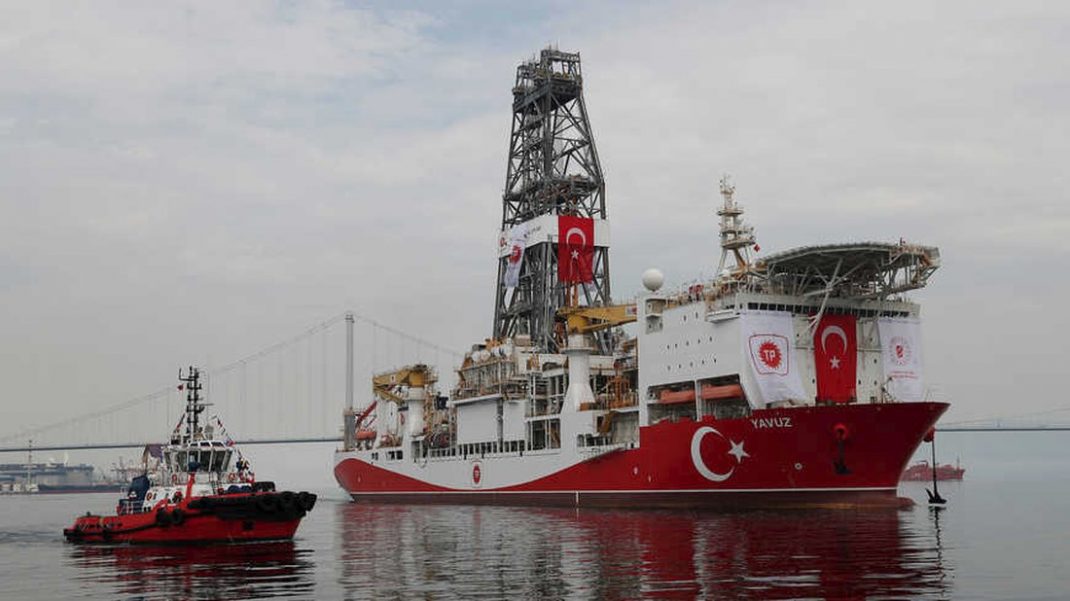By Diego Cupolo
 Disputes over tracts of the eastern Mediterranean Sea continue to rattle the region as Ankara doubles down on plans to conduct gas exploration activities in areas claimed by Cyprus and Greece.
Disputes over tracts of the eastern Mediterranean Sea continue to rattle the region as Ankara doubles down on plans to conduct gas exploration activities in areas claimed by Cyprus and Greece.
Following a Nov. 27 agreement between Turkey and the UN-recognized Libyan government in Tripoli that redrew maritime borders between the nations, European Union officials are weighing a response to fast-moving developments that have increased tensions among neighboring states.
Speaking to national broadcaster A Haber Wednesday, Turkish Foreign Minister Mevlut Cavusoglu said Turkey would not stand idle as regional energy resources are developed without Ankara’s involvement.
“Within our continental shelf, no one can conduct activity without our permission. If it happens, we will prevent it, of course,” Cavusoglu said in a televised interview.
The statements come one month after the EU unveiled a sanctions framework to be imposed over Turkey’s unauthorized gas exploration activities in Cypriot territorial waters.
These are just the latest developments in a long-running dispute over who can develop and benefit from gas fields in the EastMed, where Ankara says it’s acting to defend its and Turkish Cypriots’ rights to energy reserves that were first discovered in 2010.
Earlier this year, Turkey and the Turkish Republic of Northern Cyprus were excluded from the East Mediterranean Gas Forum established between Cyprus, Greece, Israel, Egypt, Jordan, the Palestinian Authority and Italy.
The forum seeks to jointly develop regional energy reserves and potentially export them to European markets via a pipeline that would provide an alternative to Russian gas.
The plan has been complicated by stalled peace talks in Cyprus, which has been divided along ethnic lines since a 1974 military intervention by Ankara. Turkey maintains about 40,000 troops on the island.
“The Cyprus problem stands in the way of Turkey being a player in EastMed gas, and Turkey is in a hurry because renewable energy is becoming a big competitor to gas,” Fiona Mullen, director of Nicosia-based research consultancy Sapienta Economics told Al-Monitor.
“For that reason I believe Turkey has decided to make the non-resolution of the Cyprus problem as painful as possible for as many actors as possible in the region.”
She added, “I can’t see any Cypriot gas coming out of the ground without either an end to the Cyprus problem or a gas deal in which the Republic of Cyprus finds itself giving up maritime territory.”
In his latest comments regarding developments in the EastMed, Turkish President Recep Tayyip Erdogan reiterated that the maritime boundary agreement signed with Libya’s Government of National Accord was within international law and that no unauthorized gas drilling could take place in the area demarcated by the two nations.
“With this deal, we have taken a rightful step within the framework of international law against the approaches tried to be imposed by Greece and the Greek Cypriot administration and the claims of maritime jurisdictions aiming to confine our country to the Gulf of Antalya,” Erdogan said, speaking to state broadcaster TRT Monday.
In the same interview, the Turkish leader said Ankara and Tripoli would carry out joint exploration operations in the EastMed, adding Turkey would deploy troops to Libya if the government there requested support amid a looming offensive by eastern Libyan commander Khalifa Hifter, who has said he would enter Tripoli by the end of the year.
A Moscow government spokesperson said Erdogan would discuss events in Libya by phone with his Russian counterpart Vladimir Putin in “the coming days.”
Mullen said such developments were further destabilizing the region, likely dissuading energy companies from advancing projects in the affected territories.
“Turkey blames the Greek Cypriots for stalling [peace negotiations], so its answer is to raise the risk for gas companies involved in Cyprus, Greece and now Libya,” Mullen told Al-Monitor. “With Egypt and Libya now affected, Turkey is playing a very high stakes game to force a resolution.”
Back in Ankara, the Turkish Parliament ratified the controversial agreement Thursday and has since sent it to the United Nations. Meanwhile, Greek officials have expelled the Libyan ambassador in Athens and sent two letters to the United Nations objecting the Turkey-Libya memorandum.
Text from the letters claims the move “blatantly violates the rules of the International Law of the Sea on maritime delimitation because, first and foremost, Turkey and Libya have neither overlapping maritime zones, nor common boundaries and, consequently, there is no legal basis to lawfully conclude a maritime delimitation agreement.”
In the Republic of Cyprus, leaders have launched legal action against Turkey over its gas drilling activities in the International Court of Justice in the Hague.
On Tuesday, Cypriot leader Nicos Anastasiades and Northern Cyprus leader Mustafa Akinci cancelled a planned UN reception in Nicosia, though the reason was not immediately disclosed.
Andromachi Sophocleous, a political analyst and consultant based in Nicosia, said the recent developments have created a “clear sense of insecurity” in the Republic of Cyprus and local media coverage.
“Concerns for a possible escalation have led to an increase in voices calling for the enhancement of [Republic of Cyprus defenses] and the increase in spending in that field,” Sophocleous told Al-Monitor.
“Realistically speaking, though, the tension remains within a controlled setting and I personally do not anticipate a military escalation.”
Sophocleous said the tensions were linked to stalled peace talks and would require a bilateral solution, as agreements between Turkey and the Republic of Cyprus will not be possible until diplomatic relations are normalized.
She added that pressure in the form of EU sanctions on Turkey was unlikely to create productive outcomes, as European nations rely on Ankara to stem irregular migration flows.
The migration issue “clearly limits the EU’s leverage over Turkey,” Sophocleous told Al-Monitor.
“The EU is clearly verbally expressing its solidarity with Greece and Cyprus on the matter, with some countries being more adamant than others. However, the extent to which collective, substantial and effective sanctions can be applied on Turkey is still doubtful.”
***
Diego Cupolo is a freelance journalist and photographer based in Istanbul, Turkey. His work has appeared in The Atlantic, The Financial Times, Foreign Policy and The New Statesman, among other publications.
_________
AL-MONITOR




